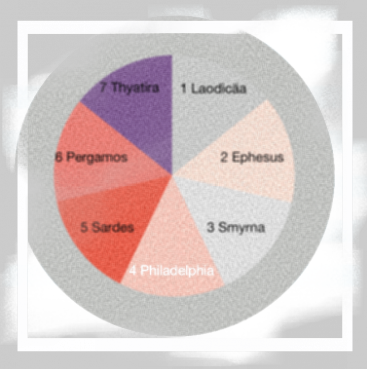Commentary of The Letter of Jude - Part 3
A Commentary of the Letter of Jude - Part 3
The autumn festivals
Interpretation of the Epistle of Jude - Verse 11
The church of Laodicea is the last church before the Lord completes His work on this earth. In this section, we look at the woes of the ecumenical triad: Sardis, Pergamos, and Thyatira.

The Autumn Feast
Verse 11a Woe to them! For they walked in the way of Cain | Thyatira
|
Verse 11b and abandoned themselves for the sake of gain to Balaam's error | Pergamos
|
Verse 11c: and perished in Korah's rebellion. | Sardis:
|
The eleventh verse is no longer addressed to a single church, but to all of them, and these are the autumn congregations of Thyatira, Pergamos and Sardis, which form, as it were, the Laodicean ecumenism. As we have already explained elsewhere, the Epistles have a public character. All the world should know what the Lord has to say about the churches. The sevenfold repetition resounds like a refrain: "He who has an ear, let him hear what the Spirit says to the assemblies."
All the world can see, it is autumn time; and all can see, the three form the ecumenical triad.
The Church of Thyatira
Verse 11a: Woe to them! For they walked in the way of Cain | Thyatira
|
Jesus' first words to the church of Thyatira are, "These things saith the Son of God." It sounds quite different in the Gospels, for there Jesus always speaks of Himself as the Son of Man sent to serve; Matthew 20:28 and Mark 10:45 When Jesus addresses Thyatira with the opening words, "This is what the Son of God says," He is no longer speaking as a servant, but speaking with supreme authority, and for an important reason. One considers, the supreme Thyatiras holds himself for the highest one, however, mimes so no longer the deputy, therefore: Attention! The end-time church of Laodicea is warned and at the same time reminded that Jesus is the Son of God, that he is the foundation stone of the church and that he is the legitimate high priest for every single believer. Jesus does not tolerate any substitutes there. The last Vicarius changed his role, he no longer plays the plenipotentiary, but he appears in his own authority.
While his predecessors claimed to be Vicarii, he now acts independently. What they all have in common is that they are counted among the Cainites. Just as Cain pursued and killed the Righteous One, they are out to murder and kill, today it is done with words, shortly blood will flow. And why do they kill the righteous man? The apostle John answers the question in his first letter, which we have assigned to the church of Thyatira. John writes: Because their works are evil, just as Cain's works were evil. 1.Joh. 3,12
When studying European history, we are proverbially led by the thread of their bloody machinations. Do you think Cain repented? Hardly to assume. But this one goes the way of Cain with all vehemence. As a descendant of the serpent he knows neither love nor mercy. Whether he or his successor plays rather a subordinate role, because John writes in his first letter, (again remember, the letter is addressed to Thyatira) in chapter 2,22: There have already become many antichrists; at present there are 315 from this system.
To the rest of the congregation of Thyatira, who do not recognize the depths of Satan, the Son of God says that they may continue their faithful service, regardless of what the one above orders or does. In summary, we can say that the unrighteous will indeed kill the righteous, but they will rise and reign with Christ, they will feed the nations with a rod of iron, as potters' vessels break the wicked. Revelation 3:27
The Church of Pergamos
| Verse 11b and abandoned themselves for the sake of gain to Balaam's error | Pergamos
|
Pergamos means fortress. What fortress is being spoken of here? Let us first look at the prophet Balaam, his name is mentioned twice in the New Testament, in Jude 1 and in 2 Peter 2:15 (we have assigned this teaching letter, also for years, to the church of Pergamos). The name Balaam is derived from the Hebrew word Balaam and means:
- not of the people,
- stranger.
Thus it becomes clear, Balaam does not belong to the people of God, because not the one is a Jew, who is it according to the flesh, but according to the spirit. The first word root of Balaam is Bal and means:
- Error, failure, fail;
- nothing.
We hold fast, the man is in the eyes of God the born failure, a nothing. For a Christian, this man poses no danger. He may kill the body, but God will destroy his body and soul in hell. Now the word bal has another subroot and that is: balah and means:
- fail;
- wear out, decay and rot (of clothing, including the belt of truth);
- consume, spend.
This man consumes at the expense of the poor, spends what he has stolen with his hands full to those who present themselves to him as "good" Balaamites. Now Balaam has a second main root and that is: Am and means:
- People;
- tribe;
- a troop or retinue;
- a flock;
and also the word Am has a subroot and that is: amam and means:
- to join, to unite, to belong to;
- overshadow (by crowding together, huddling together).
Balaam's homeland is in Mesopotamia and corresponds approximately to today's Iraq. From there once Balak, the king of the Moabites, let the prophet come, in order to curse Israel. However, because God refused him, Balaam advised King Balak to seduce Israel into fornication and took money for his advisory services. We are told similar things about Judas Iscariot, who had betrayed Jesus to the chief priests for 30 pieces of silver. The apostle Paul, in the first letter to Timothy, which we also assigned to the church of Pergamos years ago, writes the following about the subject of money: The love of money is a root of all evil, after which some (from Pergamos) have strayed from the faith. The erring ones form the synagogue of Satan, they belong to the separated ones of the separated ones.
Reflection note: Balak, the king of Moab, is a desolator who bends the truth and also demands to bow down to the lie.
©Copyright by H. Randy Rohrer
The Church of Sardis
Verse 11c: and perished in Korah's rebellion. | Sardis:
|
As we said at the beginning of this section, the eleventh verse is tricky, that is, twisted and knotted. According to our systematics we would also assign the third part of the verse to Pergamos, because in the First Epistle to Timothy the apostle Paul talks about contradictions. But in the Greek, the word antithesis is used for contradictions in 1 Timothy 6:20 and must be translated as opposition (of theories). But Jude uses the word antilogia and that means: contentiousness, contradiction, discord. The word roots to Antilogia have the following meanings:
1. word root: anti:
- instead of; in place of;
- opposed.
2. word root: logia:
- dispute, reject;
- and from it the root:
- interpret;
- and figuratively: to relate.
The verb antilogia points to Sardis, because in the letter to Titus, which we have assigned to the church of Sardis, the apostle Paul uses the word twice, the first time in chapter 1:9 as a participle and the second time in chapter 2:9 as a verb. Now for the verses:
Chapter 1:8-9: Overseers should be: hospitable, loving what is good, prudent, devout, abstinent, adhering to the reliable word according to doctrine, that he may be able both to exhort with sound doctrine and to convict those who contradict. It is already obvious that in Sardis there are people who are quarrelsome and always want to have the last word. Titus is to counter this evil by appointing good overseers. Now to chapter 2:9: Admonish the servants to be submissive to their own masters, to make themselves well pleasing in everything, not contradicting.
So the church of Laodicea (at the time of the first autumn festival it has the character of Sardis) is dealing with contradictors who oppose sound doctrine. Of these, Jude says that they will perish in their contradictions, in the same way as Korah.
Korah and his comrades went with living bodies into the abyss, after that the earth closed over them, to be read in Genesis 16. And who are the rebellious servants? These are those who are in the pay of their "boss" but do not fulfill their duties to him properly. A very conspicuous sign of our time, which can be observed especially in retail shopping. The apostle admonishes them, because their nagging and contradicting is not only disrespectful to the employer, they also dishonor the Lord.
Berlin, June 15, 2023
©Copyright by H. Randy Rohrer
©Copyright by H. Randy Rohrer
P.S.: We recommend the TOR browser because it makes surfing safer and the DuckDuckGo.com search engine because it actually shows more and better search hits.







